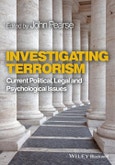Investigating Terrorism takes a look behind the closed doors of terrorist cases. Major players from the world of counter-terrorism, including politicians, lawyers, psychologists and police, offer analyses of recent terror attacks and share their knowledge of terrorist behaviour
- Deals with legal, psychological and practical issues surrounding how to deal with a real life ‘ticking bomb’ scenario
- Provides an insight into the most recent police model for interviewing witnesses, victims and suspects
- Contains the latest analyses of recent terrorist attacks including the recent Norwegian tragedy carried out by terrorist Anders Breivik
- Contains the views of major players in the world of counter-terrorism, including Lord Carlile, the former HMG’s Independent Reviewer of Terrorist legislation, and Peter Clarke, the recently retired Head of Terrorist Investigations for the UK
- Incorporates recently-released findings from studies commissioned by New Scotland Yard to study the effectiveness of police interviews with terrorist suspects
- Includes chapters discussing the context in which people become suicide bombers
Table of Contents
About the Editor ix
About the Contributors x
Introduction 1
Part I Political, Legal and Policing Context 9
1 The Impact and Consequences of Terrorist Legislation in the United Kingdom Since 2001: A Review 11
Lord Carlile of Berriew, QC, and Carys Owen
2 Investigating Terrorism in the First Decade of the Twenty-First Century: A Different Sort of Crime 31
Peter Clarke
Part II The Criminal Justice Process 43
3 Challenge, Compromise and Collaboration: Part of the Skill Set Necessary for Interviewing a Failed Suicide Bomber 45
John Pearse
4 Urgent Interviews and the Concept of Oppression in Terrorist Cases 66
Max Hill, QC
5 Defence Counsel in Terrorism Trials 80
Peter Carter, QC
6 An Garda Síochána Model of Investigative Interviewing of Witnesses and Suspects 100
Geraldine Noone
7 Risk Assessment of Terrorist Offenders: A Challenge Too Far? 123
Gisli H. Gudjonsson, AdrianWest and Amy McKee
8 Hostage Negotiation and Communication Skills in a Terrorist Environment 144
Simon Wells
Part III Individual and Group Perspectives 167
9 Understanding Suicide Terrorism: Insights from Psychology, Lessons from History 169
Andrew Silke
10 Taking Anders Breivik Seriously as a Political Terrorist 180
Robert Lambert
11 Social Psychology and the Investigation of Terrorism 202
Karl Roberts
12 Community Surveillance and Terrorism 214
Clive Walker and Simon McKay
13 Thinking about Peace While Engaged in Counter-Terrorism: The Primacy of Intelligence 239
John G. D. Grieve
Index 259








